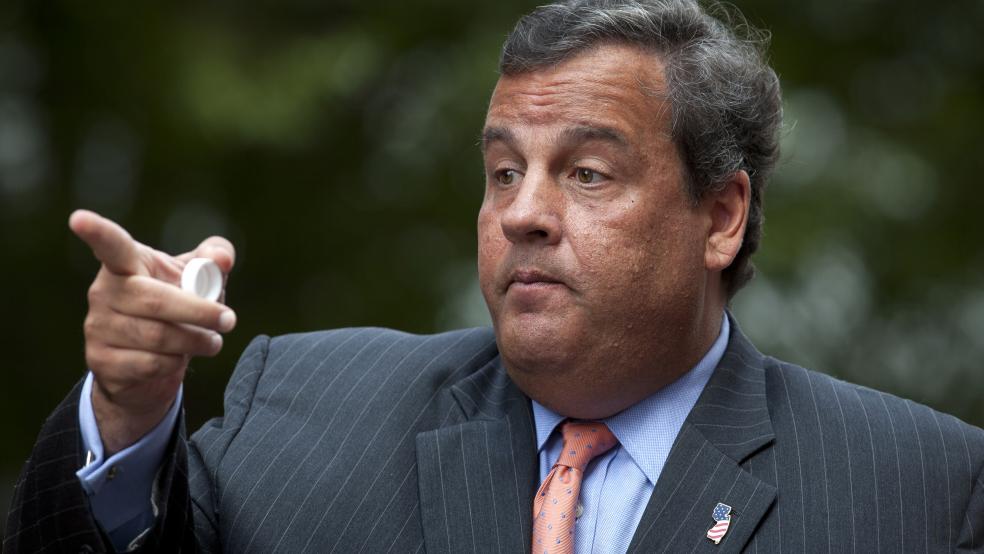A new NBC poll highlights the challenges newly reelected New Jersey Gov. Chris Christie would face if – as expected -- he mounts a campaign for the GOP presidential nomination in 2016:
For openers, Christie trails Democrat Hillary Clinton by 10 points in a hypothetical matchup, 44 percent to 34 percent. Even in New Jersey, the former secretary of state and first lady would clean his clock if the election were held today.
But more importantly, the maverick Republican governor would have a hard time unifying his party amid growing suspicion and resentment among conservative and tea party members who think Christie is too moderate.
Related: Chris Christie’s Post-Election Victory Lap
In the wake of his resounding reelection victory last week, 32 percent of Republican and Republican-leaning respondents say they would vote for Christie in a GOP presidential primary, while 31 percent prefer another Republican candidate, according to the new poll.
The survey also documented a striking geographical divide: A majority of Northeast Republicans (57 percent to 22 percent) say they would support Christie in a GOP presidential primary. Yet pluralities of Republicans in other parts of the country prefer other likely GOP candidates.
In the Midwest, for example, Republicans would prefer another candidate over Christie by a margin of 35 percent to 30 percent. In the South the split is 35 percent to 30 percent against Christie, while in the West it runs 40 percent to 22 percent against him.
Christie showed his strength as a potential national candidate with an impressive victory last week in which he won 60 percent of the vote in a state that President Obama easily carried a year ago, 58 percent to 41 percent over Republican Mitt Romney.
Analysts noted last week that Christie demonstrated broad appeal by carrying a majority of votes of women and Hispanics and making gains with blacks and young people – all groups that are vital to GOP prospects for winning back the White House in 2016.
Many establishment Republicans see Christie as the party’s best hope. “You’ve gotta say that this fella is really on the right track, if the Republican Party is not too stupid,” said Sen. Orrin G. Hatch (R-UT), according to the Washington Post.
But others in the party – including potential rivals in 2016 – are bitter towards Christie and are still fuming that his warm embrace of Obama in the aftermath of the Hurricane Sandy disaster throughout the Northeast may have hurt Romney’s election last year. Sen. Rand Paul (R-KY) said at a Senate hearing last week that Christie’s appearance in television ads paid for by Hurricane Sandy recovery funds was “offensive” and patently political and gave the efforts a “black eye.”
Related: GOP Rift Deepened over Government Shutdown
At the same time, Christie has criticized Sen. Ted Cruz (R-TX) and other Republicans in Washington for provoking a 16-day government shutdown last month in their failed effort to defund or block implementation of Obamacare.
“We’re so frustrated with all this Christie talk we can’t see straight,” Scott Hofstra, a Tea Party Republican from Kentucky told The New York Times. “He’s no more conservative than Harry Reid,” referring to the Democratic Senate majority leader.
Related: Hillary Clinton Alert: Watch Your Left Flank
According to NBC, Christie's challenges in running for president would extend beyond his own party: The poll finds Clinton getting the support of 44 percent of all adults in a hypothetical match up against the governor, who gets just 34 percent. The rest of respondents either preferred another candidate, said they would not vote, or were undecided.
And while Election Day 2016 is still more than 1,000 days away, the survey shows Clinton benefiting from the same demographic trends that helped propel Obama to victory in 2008 and again in 2012. Clinton leads Christie among African Americans (83 percent to 4 percent), among young people ages 18 to 29 by 45 percent to 31 percent, and among Latinos, 44 percent to 33 percent.
Clinton also holds strong regional advantages over Christie, and has a narrow edge among independents, 39 percent to 35 percent, according to the NBC poll.
Top Reads from The Fiscal Times:




